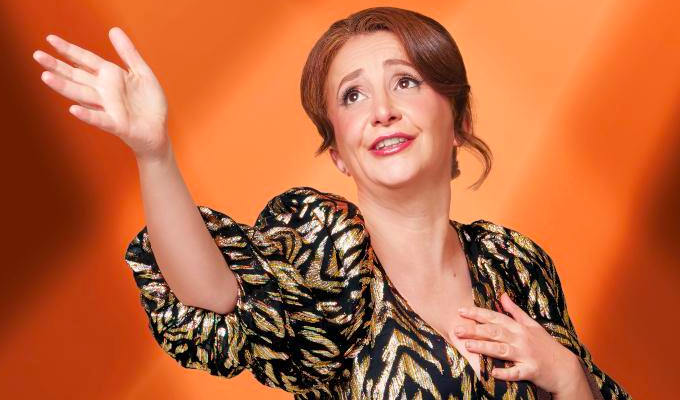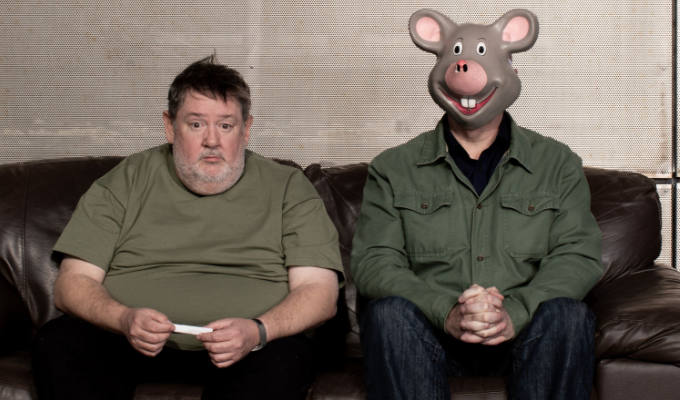Bigger isn't better
Keep comedy out of arenas, says Matt Taylor
For live music, August 15, 1965 was what Americans might call a 'game-changer'. It's the day the Beatles played to 55,000 people at Shea Stadium in New York, invented stadium rock and set in motion a course of events that would lead to Led Zeppelin, Simple Minds and- most tragically of all, Bono and his mullet.
For live comedy, at least in Britain, December 10, 1993 might turn out to have the same resonance. That was the date that, in the midst of one of comedy's periodic moments as ‘the new rock 'n' roll’ Rob Newman and David Baddiel became the first funnymen ever to play in the cavernous space of Wembley Arena.
At the time it was an extraordinary moment and a bizarre gig attended by many people as fans but by plenty of others with curious to know: Can comedy really work in a place like this?
The duo's performance tried desperately to fill the venue's void; there was a motorized skateboard for Newman to charge up the ramp to the oh-so-modern 'in the round' stage, wires were used to fly the two stars about like Motley Crue's Tommy Lee and his revolving drum-kit, and oddest of all, the final, seated History Today segment took place as the stage itself slowly rotated- giving the impression less of a comedy sketch and more of an ancient clockwork model being gently displayed in a museum.
Sensibly, no one bothered trying arena comedy again in this country for some time until Lee Evans' emergence as a major ticket shifter. His manic, stage-covering style was as well suited to such a big place as an arena as any performer was likely to be at this time but even he had to make concessions to these new venues and begin to make everything a little more massive. His end-of-set songs swiftly morphed from his classic Bohemina Rhapsodymime to full-on ballads with grand pianos, gospel choirs and enough confetti to suffocate any toddlers in the audience.
What Evans demonstrated to the rest of the comic firmament, however, was that people would pay to be part these events and see these shows – not to mention the obvious personal and financial benefits of only needing to play a handful of nights in the O2s and MEN Arenas of this world to sell the same number of tickets of a five month trawl round the Hippodromes and Apollos.
This was recently brought to it's logical conclusion by Peter Kay who not only decided that his latest tour wouldn't tour, but that he'd actually put that on the poster. The Tour That Doesn't Tour, which starts in, finishes in and never leaves Manchester next year still managed to sell approximately 4 billion tickets in 10 seconds flat.
Also, Kay's recent replacement as stand-up-du-jour Michael McIntyre has called his new DVD Hello Wembley!, which seems to suggest that the phenomenon of playing a comedy gig in such a vast hall is still novelty enough to sell a show on it's own.
The upshot of all this is that a comic in this country is now more likely to be seen as small beans until he has a show that suffixes his name with '...at the O2'; and the only way to do that it is to compromise the quality of the comedy itself.
Comedy, like magic, is at its best as an intimate artform. The really special moments happen in clubs or theatres when you can peer straight into the whites of a performer's eyes, or when a gifted comic can make an anticipatory hush descend over the crowd at will. Neither of these things are possible at the NEC – unless you count being able to see the whites in Eddie Izzard's eyes on the 20 ft Jumbotron at the side of the stage.
There are some who do appear to have resisted the temptations of the massive shows for a more traditional tour. Lee Mack, for instance, could almost certainly sell out a decent run of mega-gigs but will instead be spending much of next year trawling around theatres and I dare say he'll be all the better for it.
His is a style which could have been adapted, super-sized for the arena stages, though the chatting to the front row from which he seems to draw so much material and audience warmth would then probably had to have been ditched.
Instead they won't be as he runs through night after night playing to a mere couple thousand people who can actually all see him; though I can't help but think his accountant probably reckons Mack's beyond insane for doing it.
The most obvious warning of the perils of super-sized live comedy is Steve Martin who, in the mid-to-late Seventies, swiftly graduated from playing clubs in the US to theatres, cow-sheds and finally massive arenas of nearly 20,000 people a night.
No one had ever done this with comedy before and it pretty much killed Martin's live career. He'd spent years honing his craft for the absurd one-liner and the physical freak-out but suddenly found that people would be happy with him trotting out on stage, delivering a few catchphrases and making huge gestures in his white suit which had been custom-made to be seen from Row Z in the latest Enormodome.
He stopped talking to the audience, he stopped allowing the material to evolve and, eventually, he stopped caring. He was making people laugh but he wasn't being funny.
And then, years later, it got worse. He made The Pink Panther.
Evans, Kay, Izzard, McIntyre: you have been warned.
Published: 24 Nov 2009






